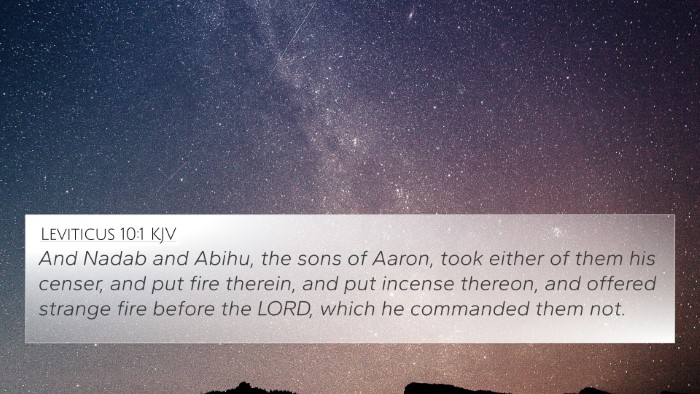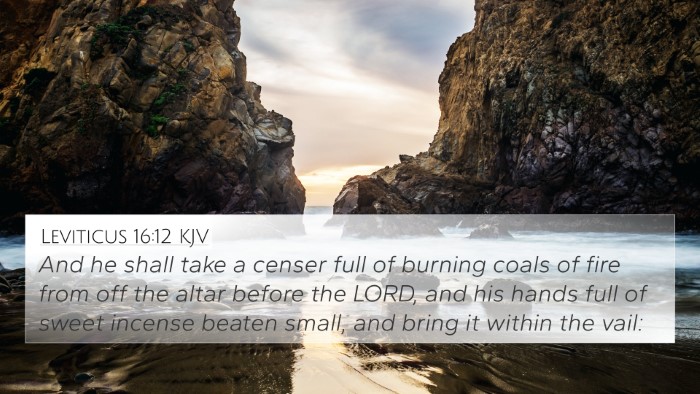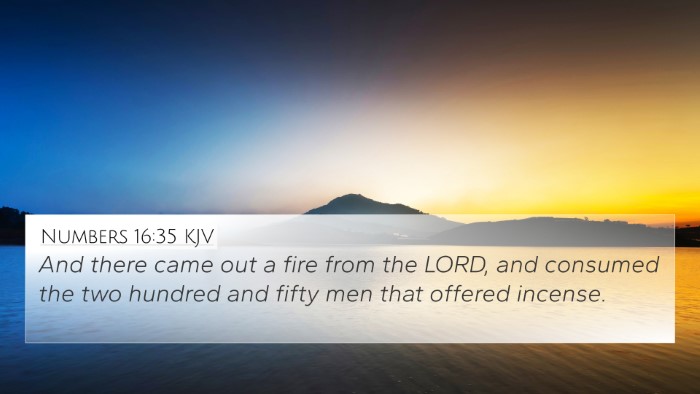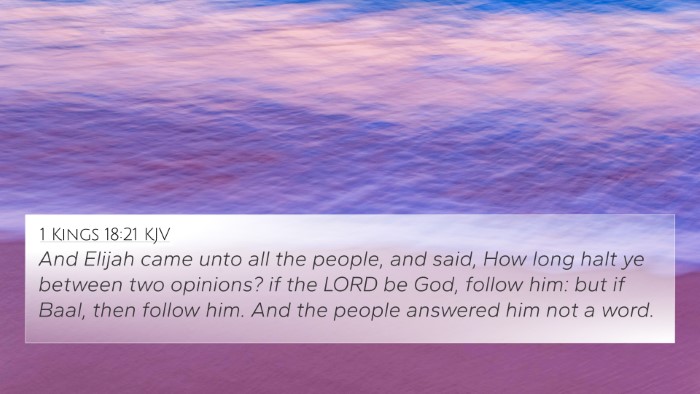Understanding Numbers 16:6
Verse: "And Moses said unto Korah, Be thou and all thy company before the Lord, thou, and they, and Aaron, tomorrow."
Meaning: This verse occurs in a significant narrative where Moses addresses the challenge posed by Korah and his followers. Korah’s rebellion centered on the desire for greater authority and recognition among the Israelites. Moses' invitation to present themselves before the Lord symbolizes divine judgment and the serious implications of their insurrection.
Insights from Commentaries
-
Matthew Henry: He explains that Moses, as a servant of God, was directed by the Lord in how to deal with this insurrection. He highlights the importance of standing before God, which serves as an opportunity for self-examination and repentance for Korah and his followers.
-
Albert Barnes: Barnes emphasizes that Moses’ call reflects God's justice and provision of a means to prove divine authority. Through this challenge, it becomes evident who has been appointed by God and who has taken more upon themselves than they were meant to carry.
-
Adam Clarke: Clarke provides insights on the gravity of this moment, noting that Korah's ambition represented a broader moral issue regarding pride and the quest for authority. He underlines that God's response to such rebellion is crucial for the community of believers in understanding divine order.
Thematic Connections in the Scripture
Numbers 16:6 exemplifies the conflicts between God's appointed leaders and those who seek to usurp authority unjustly. This can be linked to various themes in Scripture:
-
Authority and Rebellion: The theme of authority and rebellion is prominent throughout the Bible, with Numbers 16 acting as a pivotal example of how God deals with challenges to His appointed leaders.
-
Divine Judgment: This narrative reminds readers of the seriousness of standing before God and the implications of divine judgment on communities that stray from established authority.
Related Bible Cross-References
- Exodus 3:10: The calling of Moses reflects God's authority in appointing leaders.
- Numbers 12:1-2: Miriam and Aaron's challenge to Moses demonstrates conflicts among God's chosen.
- 1 Samuel 15:23: Rebellion is likened to the sin of witchcraft; disobedience against divine ordinances brings serious consequences.
- Hebrews 13:17: A directive regarding submission to leaders reflects the enduring emphasis on divinely appointed authority.
- Jude 1:11: A sermon on rebellion identifies Korah’s insurrection as a warning against similar actions in the new covenant community.
- Matthew 23:12: A teaching from Jesus warns against aspiring to positions of honor and authority within the context of humility.
- Acts 5:29: A principle on obedience to God rather than human authority can be drawn from the early church's challenges to authority.
- Romans 13:1: Authorities are ordained by God, reinforcing the understanding of divine setup in leadership.
- 1 Peter 5:5: An encouragement to be humble before God and among leaders reflects the spirit intended in divine guidance.
- 2 Peter 2:10: Warnings against despising authority resonate with the fate of Korah and his company as a further caution.
Cross-Referencing Insights
This verse demonstrates the significance of cross-referencing in understanding biblical themes. By linking Numbers 16:6 with the above references, one can see a clear thread regarding the nature of authority, rebellion, and God's sovereign dealings. Engaging in cross-referencing Bible study methods enhances our interpretation and connects the backstories of spiritual authority amidst the narratives of rebellion.
Tools for Bible Cross-Referencing
Utilizing a Bible concordance or a Bible cross-reference guide can aid in uncovering these connections and enriching your study. Understanding how to find cross-references and identifying connections between the Old and New Testament leads to a deeper grasp of Biblical themes.
Conclusion
In summary, Numbers 16:6 is a pivotal moment that encapsulates the conflict of authority from a divine perspective. The rich commentary insights and connections with other scriptures provide a robust framework for understanding not only this passage but also its implications for today's readers. Students of the Bible are encouraged to continuously explore the connections between Bible verses through diligent study and reverence.







